 W
WAfter America is an alternate history novel authored by novelist John Birmingham and released in Australia in July 2010. It was released in the United States on 17 August 2010.
 W
WAttentatet i Pålsjö skog is a 1996 Swedish alternate history novel by Hans Alfredson. In the book a group of Swedish Communists blow up a German train passing through Sweden, killing several hundred German soldiers and Eva Braun who was on board. Adolf Hitler is infuriated and invades Sweden, which surrenders on May 12, 1941.
 W
WThe Battle of Dorking: Reminiscences of a Volunteer is an 1871 novella by George Tomkyns Chesney, starting the genre of invasion literature and an important precursor of science fiction. Written just after the Prussian victory in the Franco-Prussian War, it describes an invasion of Britain by a German-speaking country referred to in oblique terms as The Other Power or The Enemy.
 W
WBeasts of No Nation is a 2005 novel by the Nigerian-American author Uzodinma Iweala, that takes its title from Fela Kuti's 1989 album with the same name. The book was adapted as a movie in 2015.
 W
WBeaufort is the first novel by Israeli author and media professional Ron Leshem. The work was initially published in 2005 and in English translation under this title in 2007. The novel was the basis for the 2007 Academy Award-nominated film Beaufort.
 W
WThe Black Coat is a historical novel by Bangladeshi-Canadian author Neamat Imam. It is "a meditation on power, greed and the human cost of politics." The Sunday Guardian commented that it is "destined to be a future classic" and will be used as the "gold standard for any book which seeks to engage with South Asian politics or history."
 W
WThe Blue Hussar is a 1950 novel by the French writer Roger Nimier. Set in Germany in 1945–1946, it tells the story of ten French hussars who operate in the French occupation army right after World War II. The perspective shifts between several different people. At the centre are the ambivalent François Sanders and his companion François Saint-Anne—the title character—who unknowingly share the same German mistress.
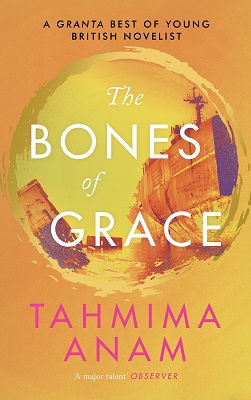 W
WThe Bones of Grace is a novel by Tahmima Anam. It is the third novel and final part of her Bengal trilogy, following A Golden Age and The Good Muslim.
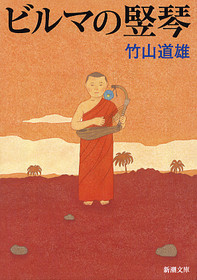 W
WThe Burmese Harp , also known as Harp of Burma, is a children's novel by Michio Takeyama. It was first published in 1946 and was the basis of two films by Kon Ichikawa – one released in 1956 and a color remake in 1985. Both films were major successes. A translation of the novel into English by Howard Hibbett was published in 1966 by Charles E. Tuttle Company in cooperation with UNESCO (ISBN 0-8048-0232-7).
 W
WNellie Campobello's Cartucho: Tales of the Struggle in Northern Mexico is a semi-autobiographical short novel or novella set in the Mexican Revolution and originally published in 1931. It consists of a series of vignettes that draw on Campobello's memories of her childhood and adolescence in Northern Mexico during the war. Though long overlooked, it is now celebrated, among other reasons because it is, as Mexican critic Elena Poniatowska points out, "the only real vision of the Mexican revolution written by a woman."
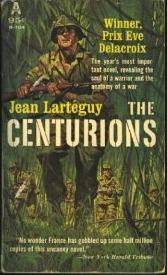 W
WThe Centurions is a novel written by French journalist and former soldier Jean Lartéguy following a French airborne battalion through the First Indochina War, Algerian War, and Suez Crisis. It was published in 1960 and translated from the original French into English by Xan Fielding. The novel included the first use of the so-called "ticking time bomb" scenario. It won the 1960 Prix Ève Delacroix. In 1966, The Centurions was adapted into a motion picture, Lost Command, that starred Anthony Quinn.
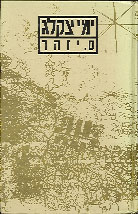 W
WDays of Ziklag is a novel by S. Yizhar, first published in 1958. It is widely considered to be one of the most prominent works in Israeli literature.
 W
WThe Dogs of War (1974) is a war novel by Frederick Forsyth featuring a small group of European mercenary soldiers hired by a British industrialist to depose the government of the fictional African country of Zangaro. The story details a geologist's mineral discovery, and the preparations for the attack: soldier recruitment, training, reconnaissance, and the logistics of the coup d'état. Like most of Forsyth's work, the novel is more about the protagonists' occupational tradecraft than their characters. The source of the title, The Dogs of War, is Act III, scene 1, line 270 of Julius Caesar (1599), by William Shakespeare: Cry, 'Havoc!', and let slip the dogs of war.
 W
WExecutive Orders is a techno-thriller novel, written by Tom Clancy and released on July 1, 1996. It picks up immediately where the final events of Debt of Honor (1994) left off, and features now-U.S. President Jack Ryan as he tries to deal with foreign and domestic threats. The book is dedicated to former U.S. President Ronald Reagan, who helped launch Clancy's worldwide success as a novelist. The book debuted at number one on the New York Times bestseller list.
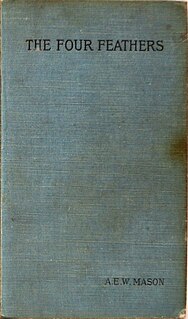 W
WThe Four Feathers is a 1902 adventure novel by British writer A. E. W. Mason that has inspired many films of the same title. In December 1901, Cornhill Magazine announced the title as one of two new serial stories to be published in the forthcoming year. Against the background of the Mahdist War, young Feversham disgraces himself by quitting the army, which others perceive as cowardice, symbolized by the four white feathers they give him. He redeems himself with acts of great courage and wins back the heart of the woman he loves.
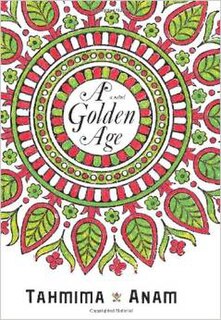 W
WA Golden Age is the first novel of the Bangladesh-born writer Tahmima Anam. It tells the story of the Bangladesh War of Independence through the eyes of one family. The novel was awarded the prize for Best First Book in the Commonwealth Writers' Prize 2008. It was also shortlisted for the 2007 Guardian First Book Award. The first chapter of the novel appeared in the January 2007 edition of Granta magazine.
 W
WThe Good Muslim is a novel by Tahmima Anam. This novel is a sequel to her debut novel A Golden Age and spans the year from 1984 to 1985, with occasional flashbacks to the aftermath of the Bangladesh Liberation War in 1971. It is a story about faith and family shadowed by a war. The family that has taken active part in the war of independence has now to face the challenges of peace, within and outside.
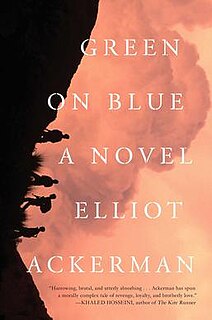 W
WGreen on Blue: A Novel is a 2015 work of fiction written by Elliot Ackerman. Set in modern-day Afghanistan, it is told through the point of view of Aziz, a young boy who must join the "Special Lashkar" – a U.S. funded militia – in order to save his injured brother. Dr. Truman Anderson has called Green on Blue a "morally complex debut novel" for how Ackerman explores the themes of loyalty to family and nation, revenge, and the brutality of war throughout the novel.
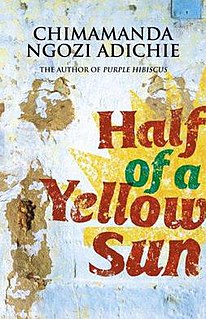 W
WHalf of a Yellow Sun is a novel by Nigerian author Chimamanda Ngozi Adichie. Published in 2006 by Knopf/Anchor, the novel tells the story of the Biafran War through the perspective of the characters Olanna, Ugwu, and Richard.
 W
WKings Will Be Tyrants by Ward Hawkins is a 1959 novel about fighting in Cuba. Bernardo Manuel Patrick O'Brien is a former U.S. Marine who winds up fighting for Castro. Though a Marine, he has to deal with the conflict of his heritage, both Cuban and American.
 W
WKiss the Dust is a book written by Elizabeth Laird on the conflicts between the Iraqi Kurds and Saddam Hussein's regime. It is a young adult historical fiction novel about a twelve-year-old Kurdish girl and her family's escape from Iraq over the border into Iran. The book was originally published in Great Britain by William Heinemann Ltd. in 1991. It was first published in the US by Dutton Children's Books, a division of Penguin Books USA Inc. in 1992.
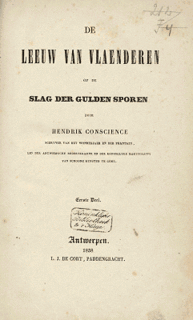 W
WThe Lion of Flanders, or the Battle of the Golden Spurs is a major novel first published in 1838 by the Belgian writer Hendrik Conscience (1812–83) and is an early example of historical fiction. The book focuses on the medieval Franco-Flemish War and the Battle of the Golden Spurs of 1302 in particular. It is written in Conscience's typical stylistic romanticism and has been described as the "Flemish national epic".
 W
WMan's Fate is a 1933 novel written by André Malraux. It was translated into English twice, both translations appearing in 1934, one by Haakon Chevalier under the title Man's Fate, published by Harrison Smith & Robert Haas in New York and republished by Random House as part of their Modern Library from 1936 on, and the other by Alastair MacDonald under the title Storm in Shanghai, published by Methuen in London and republished, still by Methuen, in 1948 as Man's Estate, to become a Penguin pocket in 1961. Currently the Chevalier translation is the only one still in regular print. The novel is about the failed communist insurrection in Shanghai in 1927, and the existential quandaries facing a diverse group of people associated with the revolution. Along with Les Conquérants and La Voie Royale, it forms a trilogy on revolution in Asia.
 W
WMore Than Conquerors is an award-winning second novel by Filipino author Edilberto K. Tiempo. The novel first appeared in 1959 in the pages of Weekly Women’s Magazine. It was first published in book format in 1964.
 W
WMy Sad Republic is a 2000 Philippine English-language novel written by Filipino novelist Eric Gamalinda. The novel won for Gamalinda a Philippine Centennial Literary Prize in 1998. The 392-page novel was published by the Philippine Centennial Commission, the University of the Philippines Press, and the UP Creative Writing Center. My Sad Republic is the fourth novel written by Gamalinda. The theme of the novel is "love, obsession, and loss" occurring during the Philippine Revolution against the Spanish colonial regime of the Philippines, and during the Philippine–American War.
 W
WOut of the Ashes is the first book in The Ashes series by William W. Johnstone.
 W
WOwen Glendower: An Historical Novel by John Cowper Powys was first published in America in January 1941, and in the UK in February 1942. Powys returned to Britain from the USA in 1934, with his lover Phyllis Playter, living first in Dorchester, where he began work on his novel Maiden Castle. However, in July, 1935, they moved to the village of Corwen, Denbighshire, North Wales, historically part of Edeirnion or Edeyrnion, an ancient commote of medieval Wales that was once part of the Kingdom of Powys; it was at Corwen that he completed Maiden Castle (1936). This move to the land of his ancestors led Powys to write Owen Glendower the first of two historical novels set in this region of Wales; the other was Porius (1951). Owen, Powys's ninth novel, reflects "his increasing sense of what he thought of as his bardic heritage."
 W
WThe Pathologies is a 2005 novel by the Russian writer Zakhar Prilepin. The Pathologies is a story about Chechen War.
 W
WThe Patriots novel series is a five-novel series by survivalist novelist and former U.S. Army officer and blogger, James Wesley Rawles. It is followed by his Counter-Caliphate Chronicles novel series.
 W
WThe Pulse of Danger is a 1966 novel written by Australian author Jon Cleary. It is set in Bhutan with the background of the Sino-Indian War. A small group of Western botanists have just finished an expedition and are returning to India where they encounter an Indian officer who has a captured Chinese general. They are pursued by Chinese forces.
 W
WThe Quiet American is a 1955 novel by English author Graham Greene.
 W
WThe Rain Goddess is a novel by Peter Stiff (ISBN 978-1919854069), set in the war-torn area of Rhodesia's North-East border, a region which the Rhodesian military staff called "Hurricane".
 W
WRegeneration is a historical and anti-war novel by Pat Barker, first published in 1991. The novel was a Booker Prize nominee and was described by the New York Times Book Review as one of the four best novels of the year in its year of publication. It is the first of three novels in the Regeneration Trilogy of novels on the First World War, the other two being The Eye in the Door and The Ghost Road, which won the Booker Prize in 1995. The novel was adapted into a film by the same name in 1997 by Scottish film director Gillies MacKinnon and starring Jonathan Pryce as Rivers, James Wilby as Sassoon and Jonny Lee Miller as Prior. The film was successful in the UK and Canada, receiving nominations for a number of awards.
 W
WRenni the Rescuer: A Dog of the Battlefield is a 1940 war novel by Felix Salten, describing the career of a military working dog called Renni, a German Shepherd dog, and his master, Georg.
 W
WThe Road From Elephant Pass is a novel by Nihal De Silva. It won the 2003 Gratiaen Prize for creative writing in English. This novel is nominated as a selection for the Sri Lankan Advanced Level Literature examinations. It has been given the themes of war and survival. The book is a great resource for the learning of survival techniques and for handling situations in a complicated relationship. The characters Wasantha and Kamala fall in love even though they belong to completely different races and liberation organisations. The novel was subsequently made into a film with the same name.
 W
WRun Me to Earth is a 2020 novel by Paul Yoon. It is his second novel and was published by Simon & Schuster on January 28, 2020. The novel tells the story of three orphans in Laos during the Laotian Civil War and follows the trajectories of their lives after they are separated. The novel is told from multiple perspectives and is divided into six stories that take place over the course of six decades.
 W
WThe Sand Pebbles is a 1962 novel by American author Richard McKenna about a Yangtze River gunboat and its crew in 1926. It was the winner of the 1963 Harper Prize for fiction. The book was initially serialized in the Saturday Evening Post, and in January 1963 it was published by Harper & Row. In 1966 it was adapted into the movie of the same name starring Steve McQueen.
 W
WSitt Marie Rose is a novel by Etel Adnan set before and during the 1975-1990 Lebanese Civil War. It was published in France in 1978, following the publication of an Arabic translation in 1977. It is based on the life of Marie Rose Boulos who was executed by a Christian militia during the conflict. The novel itself acts as a critique of various aspects of Lebanese culture, including critiques of xenophobia as well as the role of women.
 W
WSquadron Airborne is a 1955 novel by Elleston Trevor. The plot revolves around the fighter pilots and auxiliary personnel of a fictional Spitfire squadron in September 1940. At the beginning of the story a newly trained 19-year-old pilot, Peter Stuyckes arrives at Westhill, joining an established squadron already in the thick of the fighting. Less than a week later, after a number of aerial battles and many sub-plots concerning airmen and ground staff alike, the squadron is rotated to Lincolnshire for rest and refit, having suffered many casualties. This was the eighth novel to be released by Trevor under his own name although he had published many other titles under pseudonyms.
 W
WThe Stone of Laughter is a Lebanese novel, written in 1990 by author Hoda Barakat set during the Lebanese Civil War. The book was translated into English by Sophie Bennett. It is a winner of the Al-Naqid prize and the first book by an Arab author to have a main character who is homosexual.
 W
WThe Third World War is an apocalyptic novel, published in 2003 by the British journalist and author Humphrey Hawksley, portraying the modern world as it deals with the ever-worsening geopolitical situation.
 W
WThe Third World War: The Untold Story (1982) is an war novel by Sir John Hackett portraying a fictional Third World War between NATO and the Warsaw Pact forces, which breaks out in 1985. It is written in the style of a non-fiction, post-event historical account. It was published in 1982 by Macmillan in New York and Sidgwick & Jackson in London. The book is an update to Hackett's 1978 novel, The Third World War: August 1985.
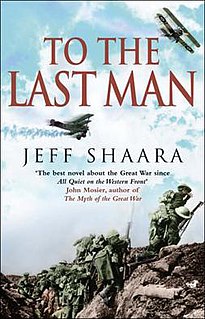 W
WTo the Last Man: A Novel of the First World War (2004) is a historical novel written by Jeff Shaara about the experience of a number of combatants in World War I. The book became a national best seller and received praise from people such as General Tommy Franks.
 W
WThe Tomorrow series is a series of seven young adult invasion novels written by Australian writer John Marsden, detailing the invasion and occupation of Australia by a foreign power. The novels are related from the first-person perspective by Ellie Linton, a teenage girl, who is part of a small band of teenagers waging a guerrilla war on the enemy soldiers in the region around their fictional home town of Wirrawee. The name of the series is derived from the title of the first book, Tomorrow, When the War Began.
 W
WTomorrow, When the War Began is the first book in the Tomorrow series by John Marsden. It was published in 1993, and is a young adult invasion novel, detailing a high-intensity invasion and occupation of Australia by a foreign power. The novel is told in first person perspective by the main character, a teenage girl named Ellie Linton, who is part of a small band of teenagers waging a guerrilla war on the enemy garrison in their fictional home town of Wirrawee.
 W
WThe Traitor Baru Cormorant is a 2015 hard fantasy novel by Seth Dickinson, and his debut novel. It is based on a short story Dickinson wrote in 2011 for Beneath Ceaseless Skies called "The Traitor Baru Cormorant, Her Field-General, and Their Wounds".
 W
WThe Two Captains is a novel written by Soviet author Veniamin Kaverin between 1938 and 1944. It is Kaverin's best known work and is considered one of the most popular works of Soviet literature, winning the USSR State Prize in 1946 being reissued 42 times in 25 years. The novel tells the story of a Russian youth, Alexander Grigoryev, as he grows up through Czarist Russia to the October Revolution to World War II. At the center of the story is Grigoriev's search for the lost Arctic expedition of Captain Ivan Tatarinov and the discovery of Severnaya Zemlya.
 W
WThe Unknown Soldier or Unknown Soldiers is a war novel by Finnish author Väinö Linna, considered his magnum opus. Published in 1954, The Unknown Soldier chronicles the Continuation War between Finland and the Soviet Union during 1941–1944 from the viewpoint of ordinary Finnish soldiers. In 2000, the manuscript version of the novel was published with the title Sotaromaani and in 2015, the latest English translation as Unknown Soldiers. A fictional account based closely on Linna's own experiences during the war, the novel presented a more realistic outlook on the formerly romanticized image of a noble and obedient Finnish soldier. Linna gave his characters independent and critical thoughts, and presented them with human feelings, such as fear and rebellion.
 W
WVortex is a 1991 war novel by Larry Bond and Patrick Larkin. Set during the final years of apartheid in South Africa, Vortex follows the assassination of a reformist National Party president and his cabinet by the African National Congress, as well as a subsequent seizure of power by far-right Afrikaners. The plot unfolds through a series of intertwining accounts narrated through several characters. It was a commercial success, receiving generally positive reviews.
 W
WWhen We Were Orphans is the fifth novel by Nobel Prize-winning British author Kazuo Ishiguro, published in 2000. It is loosely categorised as a detective novel. When We Were Orphans was shortlisted for the 2000 Man Booker Prize, though it is considered one of Ishiguro's weakest works, with Ishiguro himself saying "It's not my best book".